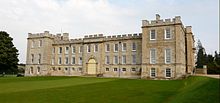|
William Montagu, 9th Duke of Manchester
William Angus Drogo Montagu, 9th Duke of Manchester PC (3 March 1877 – 9 February 1947), styled Lord Kimbolton from 1877 to 1890 and Viscount Mandeville from 1890 to 1892, was a British peer and Liberal politician. He served as Captain of the Yeomen of the Guard from 1905 to 1907 under Sir Henry Campbell-Bannerman. Early lifeManchester was born on 3 March 1877 as William Angus Drogo Montagu. He was the only legitimate son of The 8th Duke of Manchester, by his wife Consuelo Yznaga del Valle, a Cuban American heiress.[1] His sisters were Lady Jacqueline Mary Alva Montagu and Lady Alice Eleanor Louise Montagu, who both died unmarried.[2] His paternal grandparents were the 7th Duke of Manchester and the former Countess Louisa von Alten. After his grandfather's death in 1890, his grandmother got remarried to The 8th Duke of Devonshire, and was referred to as the "Double Duchess". His maternal grandfather was Don Antonio Yznaga del Valle. Among his maternal relatives was aunt Naticia Yznaga (wife of Sir John Lister-Kaye, 3rd Baronet),[3] and uncle Fernando Yznaga (husband of Jennie Smith, sister of Alva Smith Vanderbilt Belmont).[4][5] He was educated at Eton and Trinity College, Cambridge.[6] CareerManchester succeeded his father in the dukedom in 1892 at the age of fifteen, and took his seat on the Liberal benches in the House of Lords in June 1902.[7] When the Liberals came to power in December 1905 under Sir Henry Campbell-Bannerman, he was appointed Captain of the Yeomen of the Guard. He retained this post until April 1907, but never held ministerial office again. Apart from his political career he also achieved the rank of Captain in the Lancashire Fusiliers. Bankruptcy Manchester was a notorious spendthrift, and as a result of the excessive spending by him and the prior two Dukes, the family's fortune, which was already low, was completely exhausted and culminated in the sale of the family's lands during the tenure of the tenth Duke.[8] He spent much of his life abroad, evading creditors, seeking out wealthy consorts, and attempting to extract money from wealthy acquaintances.[9] He is perhaps most well known in America from the leading case of Hamilton v. Drogo, which concerned the establishment of a spendthrift trust for the benefit of the young Duke.[10][11]  In 1911 he bought a steam yacht, Conqueror, from Frederick William Vanderbilt.[12] In 1914 he and his then wife were guests aboard Vanderbilt's steam yacht Warrior when it ran aground in a heavy sea on the Caribbean coast of Colombia. The yacht could not be refloated, and the Vanderbilts and the Manchesters were rescued the next day by a steamship.[13] Personal life On 14 November 1900, at Marylebone Church in London, Manchester was married to Helena Zimmerman, without her father or his mother present. She was the daughter of Eugene Zimmerman of Cincinnati, Ohio, a railroad president and major stockholder in Standard Oil.[14] The marriage was secret and his mother, Consuelo, was appalled by it.[citation needed] Together, they had four children:[2]
The Duke and Duchess of Manchester divorced in December 1931.[15] On 17 December 1931 Manchester married stage actress Kathleen Dawes, daughter of W. H. Dawes, a West End theatrical manager who was from Greenwich, Connecticut.[16] There were no children from this marriage.[2] The Duke of Manchester died at Seaford, East Sussex, on 9 February 1947, aged 69, and was succeeded in his titles by his son Alexander. The Dowager Duchess of Manchester died on 28 March 1966.<ref name=DM|> Ancestry
References
External links
|
|||||||||||||||||||||||||||||||||||||||||||||||||||||||||||||||||||||||||||||||||||||||||||||||||||||||||||||||||||||||||||||||||||||||||||||||||||||||||||||||||||||||||||||||||||||||||||||||||||||||||||||||||||||||||||||||||||||||||||||||||||||||||||||||||||||||||||||||||||||||||||||||||||||||||||||||||||||||||||||||

